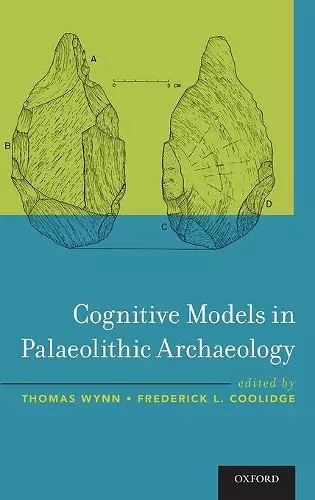Cognitive Models in Palaeolithic Archaeology
Thomas Wynn editor Frederick L Coolidge editor
Format:Hardback
Publisher:Oxford University Press Inc
Published:8th Dec '16
Currently unavailable, and unfortunately no date known when it will be back

How did human thought evolve into the highly complex process it is today? In the field of evolutionary cognitive archaeology, cognitive science and archaeology intersect to provide a more complete and grounded picture of the mind. With the combination of cognitive theories and archaeological evidence, this burgeoning field is only beginning to tap into the potential for a better understanding of the development of specific cognitive abilities. Cognitive Models in Palaeolithic Archaeology explores hominin cognitive development by applying formal cognitive models to analyze prehistoric remains from the entire range of the Palaeolithic, from the earliest stone tools 3.3 million years ago to artistic developments that emerged 50,000 years ago. Several different cognitive models are presented, including expert cognition, information processing, material engagement theory, embodied/extended cognition, neuroaesthetics, visual resonance theory, theory of mind, and neuronal recycling. By examining archaeological remains, and thereby past activities and behavior, through the grounded lenses of these models, a mosaic pattern of human cognitive evolution emerges. This volume, authored by many leading authorities in the field of cognitive archaeology, will attract scholars and students of cognitive evolution and paleoanthropology, who will find a new understanding of hominin cognitive evolution and substantive conclusions about our hominin evolution as opportunities for further research.
“This is an area of great importance in understanding humanity, one of rapid development and one where new views of theory and practice are essential to continued progress. Thomas Wynn and Frederick L. Coolidge have put together a fascinating new collection that has real substance and is both topical and thought-provoking. It will be a 'must read' for a professional audience, and can provide a useful spine for teaching cognitive evolution modules. This book will certainly be seen as on the cutting edge of current thinking.> * John Gowlett, PhD, Professor of Archaeology, University of Liverpool *
“If mind is a process, we need to investigate the relationships among its parts. This book frames cognitive models into an evolutionary perspective, a necessary step to disclose those relationships. Knowledge is about questions, and this publication shows that cognitive archaeology is now looking for its own ones.> * Emiliano Bruner, PhD, Centro Nacional de Investigación sobre la Evolución Humana (España) *
“This offering from the standard bearers of cognitive archaeology will be a stimulating read, with both new ways of looking at the record and new ideas of when and where specific cognitive abilities are first manifested. I am particularly excited by the number of developments in cognition, including in expertise and Theory of Mind, that are suggested to occur within the Acheulean period.> * Ceri Shipton, PhD, Fellow in East African Archaeology, British Institute in Eastern Africa, Nairobi; McDonald Institute for Archaeological Research, University of Cambridge *
ISBN: 9780190204112
Dimensions: 157mm x 236mm x 20mm
Weight: 476g
240 pages